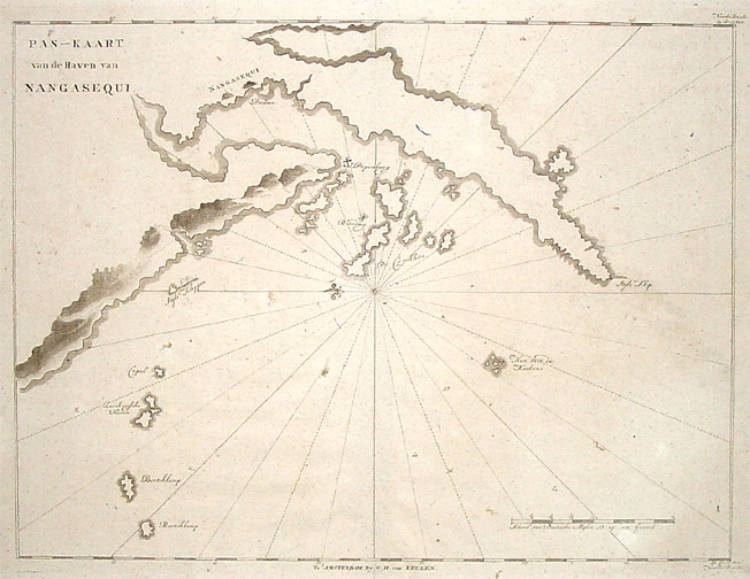Leen Helmink Antique Maps & Atlases
www.helmink.com
van Keulen - Pas-kaart van de Haven van Nangasequi
Certificate of Authentication
This is to certify that the item illustrated and described below is a genuine and
original antique map or print that was published on or near the given date.
Dr Leendert Helmink, Ph.D.

Cartographer
Johannes van Keulen II
First Published
Amsterdam, 1753
This edition
1753 first and only edition
Size
39.2 x 52.3 cms
Technique
Copper engraving
Stock number
18141
Condition
excellent
Description
Very rare chart that appears in the third and last edition of the rare Part VI of the Zee-Fakkel only. The only printed Dutch sea chart that focuses on the Japanese trade station, the sole port of entry where the Dutch East India Company was the only Western contact for Japan for more than two centuries.
"The development [ of the van Keulen atlases ] culminated
in the publication of Part VI: the famous pilot-guide for the
East Indies."
(Koeman).
"The sixth part of the 'Zee-Fakkel' holds an exceptional
position among the atlases published by the House Van
Keulen. It contains the desciptions and the charts pertaining
to the navigation in East Asian waters, a region where the Dutch
held a prominant and envied position; this required a certain
secrecy in matters of charts and sailing instructions for the
pilots. In the sixt part of the 'Zee-Fakkel', published in 1753,
these instructions and charts were given in print for the first
time.
Long before 1753, detailed information on the coasts and
waters in Asia and the Maleisian Archipelago was only distributed
in manuscript form to the pilots of the merchant vessels which sailed from Amsterdam. This information was embodied in the
so-called 'Secret atlas of the V.O.C.' (Verenigde Oostindische Compagnie = United East India Company). The charts were
kept in the East India Housein Amsterdam under custody of
the Hydrographer of the V.O.C. [...].
Several of the charts in the sixth part of the 'Zee-Fakkel' were
engraved after the Ms. master-models in the archives of the V.O.C.
[...].
During the period 1726-1755, when Johannes van Keulen II was
in office as Hydrographer of the V.O.C., the first charts for the
navigation to the East Indies and in the Malasian Archipelago
were engraved. [...] They mark the beginning of what was to
become the pilot guide for the East Indies. Gradually, when a
policy of secrecy was no longer of use because English and
French charts of Asian waters has already appeared in print,
more Dutch charts were published. FInally, in 1753, Johannes
van Keulen II issued the entire set, provided with a text by Jan
de Marre. The splendor displayed in Part VI marks this volume
as the most beautiful pilot guide ever published in Amsterdam. [...].
Immediately after 1753, Joh. van Keulen started revision of the work.
He added new charts and a final edition with register and numbered platesappeared after his death, ca. 1757. But no edition is known
with a date other than 1753 on the title page."
(Koeman).
Johannes van Keulen (1654-1711)
Gerard van Keulen (son) (1678-c.1727)
Johannes van Keulen II (grandson) (active 1726-1755)
The Dutch produced a remarkable number of enterprising and prolific map and chart makers but not even the Blaeu and Jansson establishments could rival the vigour of the van Keulen family whose business was founded in 1680 and continued under their name until 1823 and in other names until 1885 when it was from wound up and the stock dispersed at auction.
Throughout the history of the family, the widows several of the van Keulens played a major part, after their husbands' deaths, in maintaining the continuity of the business. The firm was founded by Johannes van Keulen who was registered as a bookseller in Amsterdam in 1678. In 1680 he published the first part of his 'Zee Atlas' which, over the years, was expanded to 5 volumes and continued in one form or another until 1734. More ambitious and with a far longer and more complicated life was his book of sea charts, the 'Zee-Fakkel', first published in 1681–82, which was still being printed round the year 1800. A major influence in the development of the firm was the acquisition in 1693 of the stock of a rival map publisher, Hendrik Doncker.
Although the firm was founded by Johannes van Keulen, he was primarily a publisher; it was his son, Gerard, a talented engraver, mathematician, Hydrographer to the East India Company, who became mainspring of the business which not only published charts but also books on every aspect of geograpy, navigation and nautical matters,
(Moreland and Bannister)
It was grandson Johannes van Keulen (II) who in 1753 produced Volume VI of the Zee-Fakkel for the VOC East Indiamen, containing printed charts for the navigation covering the waters from the Cape of Good Hope to Nagasaki . The atlas was not commercially sold and only for use on board of VOC ships, therefore it is also refered to as the 'secret atlas' odf the VOC. The engraving quality and craftmanship surpasses that of all earlier printed sea charts.
Sea charts from the secret atlas are among the rarest and most desirable sea charts for collectors.